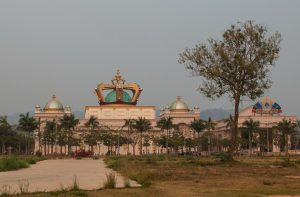A sanctioned Chinese casino magnate is backing the construction of a new international port on the Mekong River in Laos, adjacent to his Golden Triangle gambling and tourism complex.
Zhao Wei, the chairman of the Kings Romans Group, broke ground on the $50 million port development in a ceremony on October 3, which was attended by Laos’ Deputy Prime Minister Bounthong Chitmany, according to local media reports.
Zhao and Kings Romans control the Golden Triangle Special Economic Zone (GTSEZ), a palm-studded gambling and tourism fief that sprawls along the Mekong at the point where the borders of Myanmar, Laos and Thailand converge. Dominated by the classical statuary and giant golden crown of the Kings Romans Casino, the GTSEZ has been set up to attract tourists and pleasure seekers from China, where gambling is banned outside Macao.
According to a report by Radio Free Asia (RFA), the new international river port will be built at the Lao village of Ban Mom, which sits on the stretch of the Mekong running between Laos and Myanmar.
One official from Bokeo, the Lao province in which the GTSEZ sits, confirmed to RFA that Zhao was the owner of Osiano Trading Sole Co., the new port’s main investor. According to the official, Zhao took over the project after Vietnamese, Lao and Thai firms pulled out of the venture. The port, which will take nine years to complete, will mostly handle river cargo from China.
Zhao, who hails from Heilongjiang province in China’s northeast, has spent most of his career in various parts of the Asian casino business. He first operated casinos in Macao, where he reportedly holds permanent residency, and later in Mong La, a town in the Burmese section of the Golden Triangle, which lies just over the border from China’s Yunnan province.
Mong La, the largest town in a special region under the control of the rebel outfit calling itself the National Democratic Alliance Army (NDAA), has gained infamy as a hub of gambling, prostitution, and trade in endangered wildlife. During a visit in 2014, I saw products like tiger skins and ivory for sale openly around town.
In 2007, the Lao government granted Zhao a 99-year lease on 10,000 hectares of prime land along the Mekong. Under the de facto sovereignty of Zhao, whom local Chinese businesspeople refer to as tu huangdi, or “the local emperor,” the GTSEZ has since evolved into a miniature clone of Mong La.
In 2015, campaigners working for the London-based Environmental Investigation Agency described the GTSEZ as an “illegal wildlife market for Chinese tourists.” It reported that boutiques behind the Kings Romans Casino sold illegal wildlife products, including tigers, leopards, elephants, rhinos, pangolins, helmeted hornbills, snakes and bears, allegedly smuggled downstream from the NDAA’s territory in Myanmar on Chinese cargo boats.
In January 2018, Zhao was sanctioned by the U.S. Treasury Department along with three associates for engaging in “drug trafficking, human trafficking, money laundering, bribery and wildlife trafficking, much of which is facilitated through the Kings Romans Casino.”
Zhao later dismissed the U.S. sanctions as “a unilateral, extraterritorial, unreasonable and hegemonic act” and said that his investments were all “legal, ordinary business operations supervised by the legal authorities of the relevant countries that have not harmed the interests of any country or individual.”
While Kings Romans already controls a small port and passenger terminal across from the Thai town of Sop Ruak, the new upstream port will enable it to handle larger shipments away from the greater public scrutiny at the Golden Triangle confluence. Ban Mom lies along the remote and poorly-policed stretch of the Mekong River that runs north of the triborder area toward the border with Yunnan.
Once complete, the new port will supercharge the smuggling route that already runs from the NDAA-controlled port at Sop Lwe, upstream on the Myanmar bank of the Mekong, toward the GTSEZ. In an interview with Radio Free Asia, Brian Eyler of the Washington-based Stimson Center observed that there was already large commercial port around 15 kilometers further downstream in Thailand, raising questions about the need for a new international port in Laos. As a result, he predicted, the new port at Ban Mom “will mostly facilitate commerce, legal and illicit, of goods from China that will benefit Chinese commercial interests, legal and illicit, in Laos.”

































